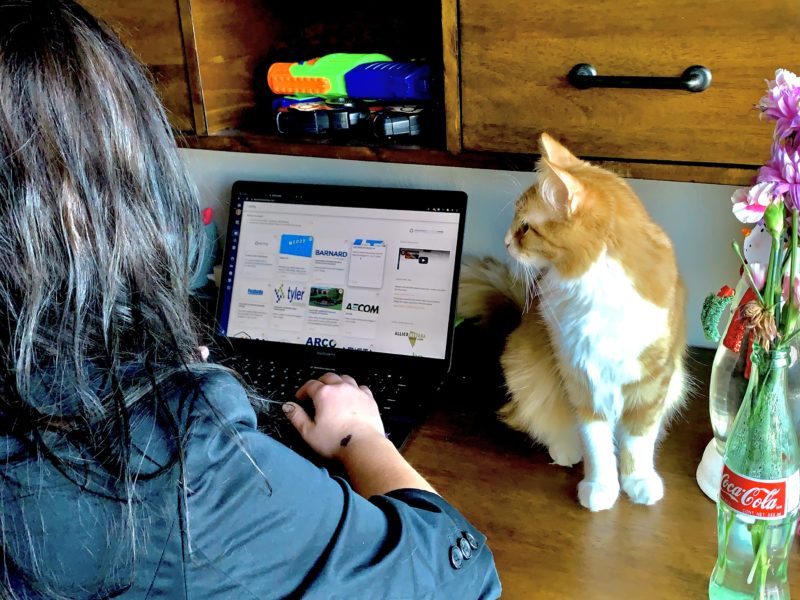
Students were asked if they thought paying for online homework was reasonable. Their survey responses are above.
Everyone on campus has had this experience at some point: after poring over lecture notes, the TA’s advice, and Snapchats of friends’ work, you finally see it; hours of crunching numbers and several cups of coffee later, you get the green box! You would celebrate, but you have four hours to sleep until your 8 AM the next morning.
And you have probably also experienced the opposite: on your last try, INCORRECT still has the audacity to flash across your screen and you begin considering other career options.
The exponential rise in technological progress in recent years has caused waves throughout every industry and education is no exception. Textbook publishers, like McGraw Hill and Pearson, have begun implementing programs that give students access to interactive online homework and studying tools. In many ways, these programs have helped universities manage time and money more efficiently and give students immediate and helpful feedback to solving problems and understanding concepts.
Students, however, have different opinions. Online homework, which can count for almost a third of a student’s overall grade, costs a great deal of money. On average, students at Mines have spent about $165 on online homework access per semester.
“If the online homework is included in the price of the textbook, that is one thing,” stated one student. “However, if it is not included, I am paying to be able to get a good grade. I could do extra practice from the textbooks on my own.”
“It’s a little ridiculous to have to pay to access homework,” stated another student. “It’s like we have to pay to get a decent grade. College is already so expensive and having to pay money to do the coursework to participate in a course you’re paying to be in seems repetitive and excessive.”
On the other side, Mines’ teaching faculty members have varied opinions on online homework fees. Dr. Scott Houser, Teaching Associate Professor in Economics, believes that investing in an interactive online program is more beneficial to students than using textbooks.
“If students learned from the textbook, then the textbook would be valued,” stated Houser. “I feel bad about making students buy a 200-dollar textbook that they’re not going to use. I’d rather have them pay 100 dollars for a system that’s going to help them master the material.”
The physics faculty, whose homework system LON-CAPA is free to students, feel differently. Dr. Hsiapo Kuo, Teaching Professor in Physics, believes that if there are enough resources to provide a free homework alternative, then it is unnecessary for students to be charged money to access learning material necessary for their success.
“The whole point of homework is to provide avenues where students can practice,” stated Kuo. “If that’s part of the focus of the learning, then why are they paying to get that benefit?”
Dr. Pat Kohl, Teaching Professor in Physics, similarly believes that the cost of online homework can be unfair to students. “Free systems exist and aren’t terribly hard to use. And we already ask students to pay a lot of tuition and fees,” stated Kohl. “I feel a certain responsibility for taking cost into account in all my course decisions – and if I don’t, the publishing houses certainly won’t feel any need to compete on prices.”




'Online Homework: What’s the Cost of a Green Box?' have 4 comments
November 14, 2016 @ 8:30 am Eric
Two things leap to mind here:
1. Asking students what they think about online work is fine, however just be sure you know this: As a matter of empirical fact, students–taken together–do less work and lower quality work when a well-built and technically sound big brother isn’t watching. Also, when students *say* they’re right and the homework system is wrong, very often they have simply misunderstood some critical fact, and, not knowing this, they are complaining about the system, when it really could be the other way around.
2. The general term “homework system” encompasses a broad array of products, ranging from homemade and cheap to extremely well-made and technically sound products. The devil here is–as always–in the details.
That is all.
November 14, 2016 @ 8:36 am Andrew
Right!, Also: among folks in the know, LON CAPA is almost universally regarded as the Yugo (a cheap Yugoslavian auto that briefly appeared and then disappeared in the 1980’s) in the world of possible e-homework systems. Really very poor on most accounts. It is also way, way behind technically, and only free in the sense that puppies are free. It takes a lot of the finite energies of your faculty to set up and use. Presumably, there is an opportunity cost (and hence a hidden tuition or course fee price to be paid) here.
LON CAPA is a Yugo:
http://content.time.com/time/specials/2007/article/0,28804,1658545_1658533_1658529,00.html
November 17, 2016 @ 8:27 am Jack
Interesting comments from Eric and Andrew. A lot of marketing speak, strongly in favor of pay-for-play systems. And one of them is a direct reply that while being fairly long and complex is somehow timestamped a mere six minutes after the first.
To borrow a phrase, “folks in the know” are painfully aware of just how many comments and reviews online are fake, written by employees or contractors of corporations. I do believe we have some publisher shills posting here.
November 21, 2016 @ 8:26 am Ad Hominem
ad hominem attacks alerts